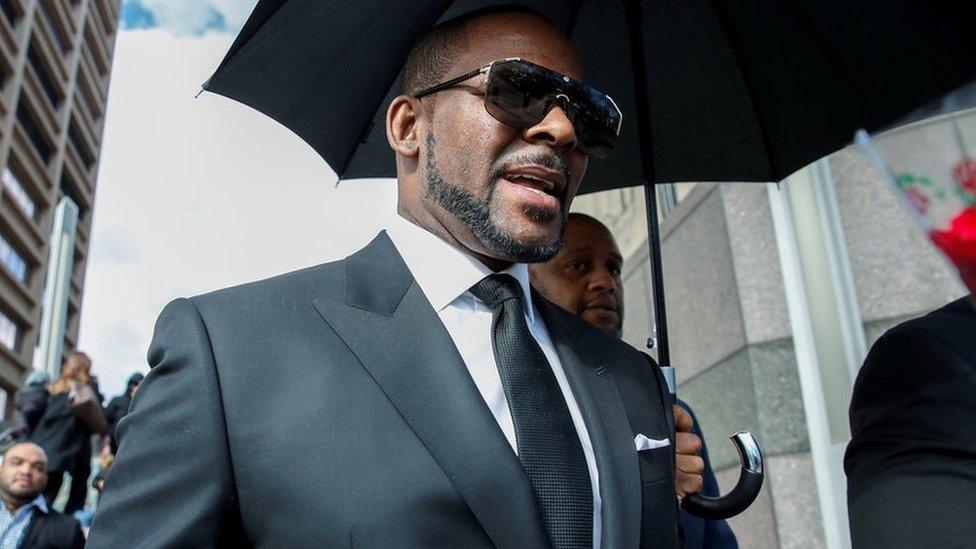Jim DeRogatis: The thorn in R. Kelly's side
- Published
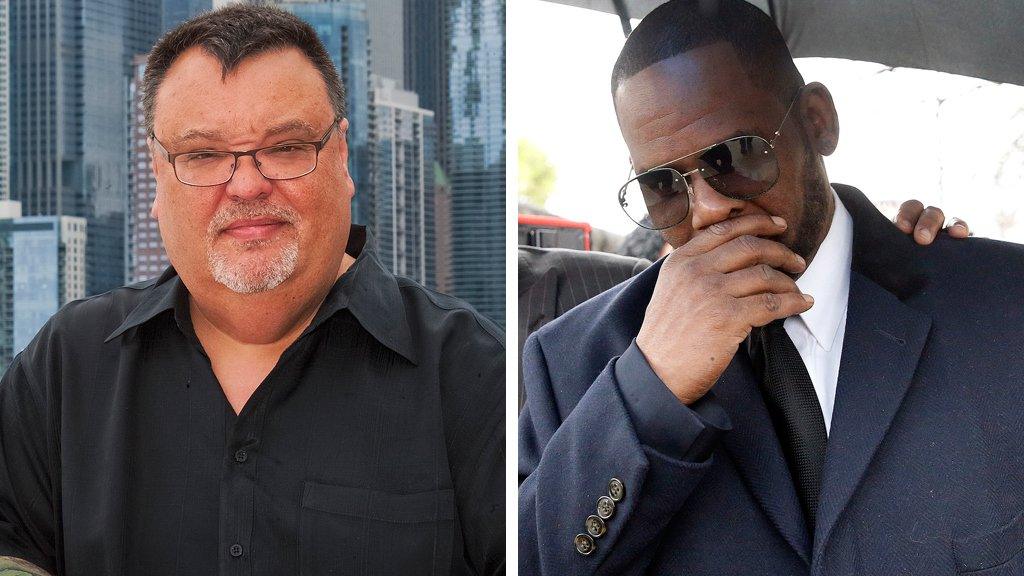
Jim DeRogatis: "I know the names of 48 women, I believe there are many more."
It started with a fax.
"Dear Mr DeRogatis," it began. "I'm sending this to you because I don't know where else to go."
Mr DeRogatis, Jim to his friends, was the rock critic at the Chicago Sun-Times newspaper. He'd recently reviewed TP-2.com, the fourth album by R&B star R. Kelly, and one of his readers had some feedback.
"You compared him to Marvin Gaye," they wrote. "Well, I guess Marvin Gaye had problems, too, but I don't think they were like Robert's.
"Robert's problem - and it's a thing that goes back many years - is young girls."
Initially, DeRogatis dismissed the letter, throwing it in a "slush pile of press releases and hate mail" on the corner of his desk.
But later, at home, the letter "gnawed" at him.
"There was a level of detail, of specificity," he tells the BBC. "Names, dates, a lawsuit that had never been reported by the media and the fact that the Chicago police department had been investigating Kelly for sex with underage girls for some time."
DeRogatis and his colleague Abdon Pallasch started to investigate and, six weeks later, on 21 December, 2000, the Chicago Sun-Times published a story about Kelly's alleged predation on underage girls, external.
It was the first of many.
For 19 years, DeRogatis has doggedly reported the accusations against R. Kelly, doing more than any other journalist to tell the stories of the women and girls who say they've been abused, victimised and assaulted by the singer.
"I know the names of 48 women, I believe there are many more," he says. "All of these women cannot be lying."
The writer lays out the case against Kelly in his new book, Soulless. He details not just the accusations of sexual abuse, but Kelly's complex history of out-of-court settlements, the music industry's complicity in his actions, and law enforcement's failure to bring him to justice.
"It was never a book I wanted to write," he says. "That darkness will eat you alive.
"But you are not a journalist if you don't follow a story through to the end. And the women have never stopped calling since November 2000."
'Brother needs to stop'
Kelly has always denied the accusations against him, both in court and in the press - including a remarkable TV interview with Gayle King in which he tearfully and angrily protested his innocence.
DeRogatis, however, argues that "nothing I've ever reported in 19 years has ever been retracted, corrected or become the subject of [a] lawsuit".
R. Kelly speaks directly to the camera during an interview on television in the US.
He believes not just the women who came forward, but the people around Kelly who spoke on and off-the-record about the star's desire for teenage girls.
What's striking, however, is how few of them were prepared to condemn Kelly. They simply wanted him to be cured.
"That first fax was not, 'R Kelly is a monster, he's evil,'" says DeRogatis. "The fax was, 'Robert has a problem. Robert needs help.'
"That's the most often-heard comment in 19 years of reporting on this: 'Brother needs help. Brother needs to stop'."
Allow YouTube content?
This article contains content provided by Google YouTube. We ask for your permission before anything is loaded, as they may be using cookies and other technologies. You may want to read Google’s cookie policy, external and privacy policy, external before accepting. To view this content choose ‘accept and continue’.
It's not just the victims that fell under Kelly's spell, DeRogatis argues. Chicago's churches, radio stations and even its justice system have been "reluctant to turn on him".
"I think that people were aware of Kelly's upbringing - he was a victim of sexual abuse himself, he was illiterate, and he rose from busking for change on the street corners to become the dominant voice in R&B for two generations," says the writer.
"Nobody hated this man. Everybody cheered him on."
Behind the scenes, though, people were disturbed by Kelly's behaviour.
In 2002, DeRogatis received a video that appeared to show the singer having sex with, and urinating on, an underage girl.
The tape was handed to the police, and Kelly was indicted on 21 counts of child pornography (later reduced to 14).
But the case didn't come to trial for six years and, when it did, the girl in the video and her parents declined to testify.
Unable to identify the victim definitively, the jury found Kelly not guilty on all 14 counts.
The case coincided with one of the most successful periods of R. Kelly's career. Between his indictment and acquittal, he released the global number one Ignition (Remix), made a joint album with Jay-Z, and played at ceremonies for the World Cup and the Winter Olympics.
Despite his legal troubles, he doubled-down on sexually promiscuous lyrics, even adopting a new nickname: "The pied piper of R&B".
Speaking to GQ in 2016, external, Kelly claimed to be unaware of the connotations. "I started calling myself the Pied Piper, when I started using the flute sound in my music," he said - but DeRogatis suspects he was deliberately taunting his critics.
"Whether he's aware or not, this myth from the middle ages describes a man who uses music to lure children to their death. It's horrifying."
DeRogatis argues that Kelly star has "flouted his obsessions in his music" since the start of his career.
It's there, he says, on songs like (It Seems Like) You're Ready, and Age Ain't Nothing But A Number - written for R&B star Aaliyah, who Kelly married when she was just 15 (her age was falsely listed as 18 on the wedding certificate, and the marriage was quickly annulled).
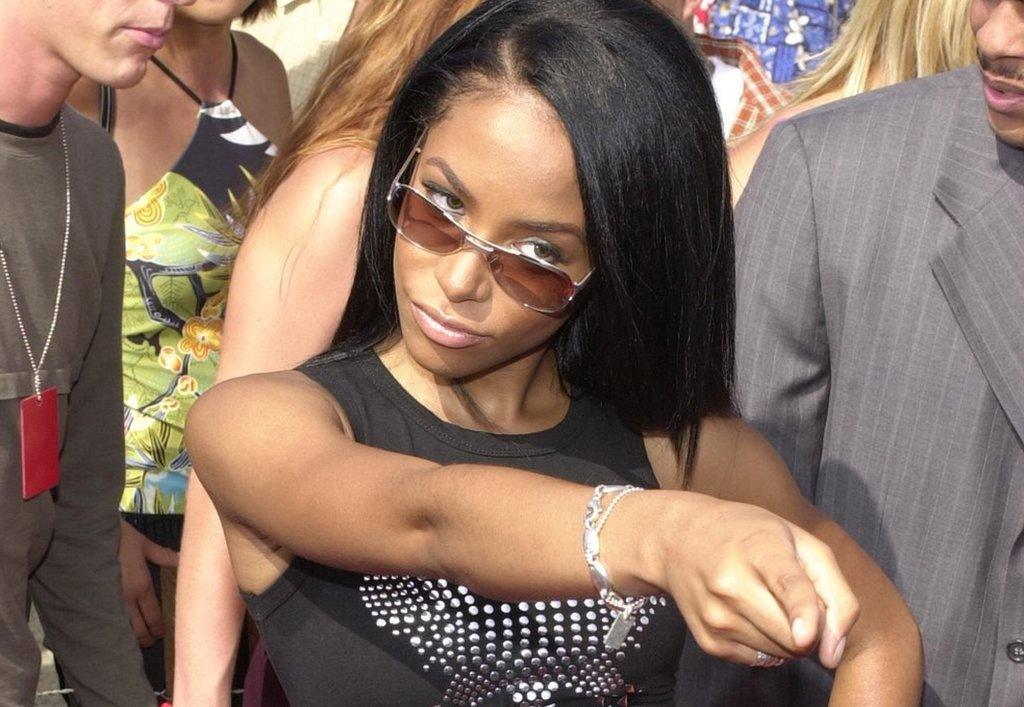
Kelly wrote and produced Aaliyah's debut album, calling it Age Ain't Nothing But A Number
"I've interviewed several psychologists and they say there's an element where it's almost as if he wanted to be caught," he notes.
Kelly certainly sails close to the wind, if you're to believe the two sources who told DeRogatis that the star "documented his sexual encounters and carried the tapes in a gym bag he kept with him at all times".
If that's the case, how has he evaded the law for so long?
"I think nobody took seriously the fact that young black girls were being hurt," says the writer.
"I say this and it sounds like hyperbole - but if you talk to any three women in Chicago, one of them will have a story. Either about herself, or her cousin or her aunty or a friend having been approached by Kelly."
"And I'm only ever amplifying the many women I've interviewed when I say, 'Nobody matters less in society than young black girls.'"
Self-aware enough to know how it looks for him, as a white man, to have pursued the case against a black celebrity for two decades, he adds: "To be clear, it is not a vendetta or hatred against this man. It's the desire to make him stop hurting other young women."
New charges 'are weak'
For his efforts, DeRogatis has been vilified and threatened by Kelly's supporters. Pictures of his ex-wife and daughter have been circulated on social media. In 2002, someone shot out his porch window.

R Kelly has sold more than 100m records, with hits including I Believe I Can Fly and Ignition (Remix)
Since leaving the Sun-Times, DeRogatis has broken further stories about Kelly at Buzzfeed, and is currently a contributor at The New Yorker's website, where he continues to write about Kelly.
As we talk, the star is awaiting trial on new charges of sexual assault and abuse involving four alleged victims, three of whom were minors - including the victim at the centre of the 2008 case.
DeRogatis says the charges are "serious, but not serious enough," and expresses doubt that Kelly, who has pleaded not guilty, will be convicted.
"It's still just a few accusers - and those are very brave women - but the defence will destroy them on the stand.
"Such is rape culture," he says. "Sadly, in the States and many other countries, we do not believe the accusers."
He holds out more hope for the concurrent investigations by the FBI, the Department of Homeland Security and the IRS - which he believes may result in charges "within the month".
"My understanding is that they're looking at 30 years of tax evasion, 30 years of sex trafficking," he says.
"So maybe R Kelly finally is disabled from hurting more young women because of tax evasion and the Mann act," he says - referring to the 1910 law that made it illegal to "transport any woman or girl" across state lines "for any immoral purpose" (the same law sent Chuck Berry to jail in 1959, external).
Would he consider that justice?
"I don't know what justice looks like," says DeRogatis. "Of the 48 women whose names I know, most of whom I've spoken to, it's too little, too late. They can't get their lives back. Some of them tried to kill themselves. They were scarred by this.
"So I would hope, at the very least, he's never able to hurt another young woman.
"There should be no more names to add to that list."
Soulless: The Case Against R. Kelly is out now.

Follow us on Facebook, external, on Twitter @BBCNewsEnts, external, or on Instagram at bbcnewsents, external. If you have a story suggestion email entertainment.news@bbc.co.uk, external.
- Published24 February 2023
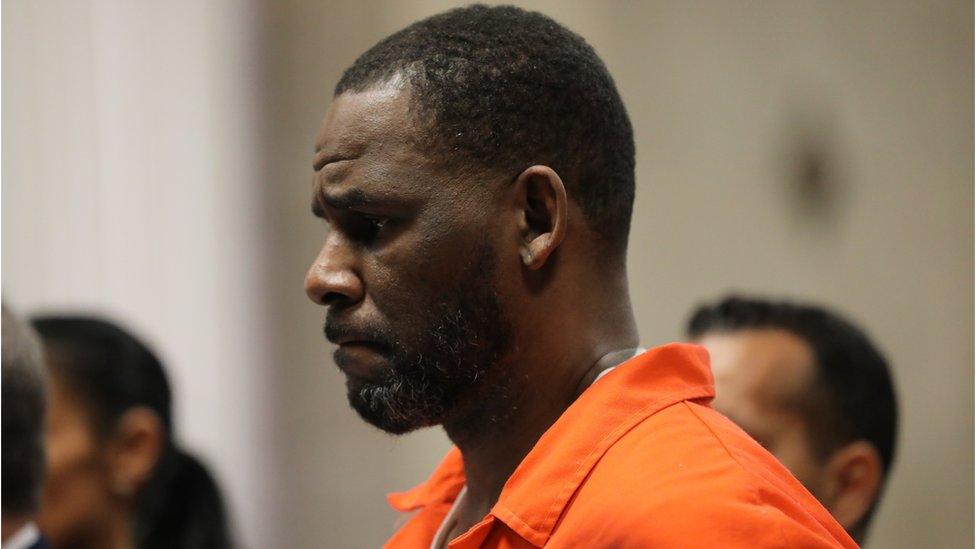
- Published23 January 2019
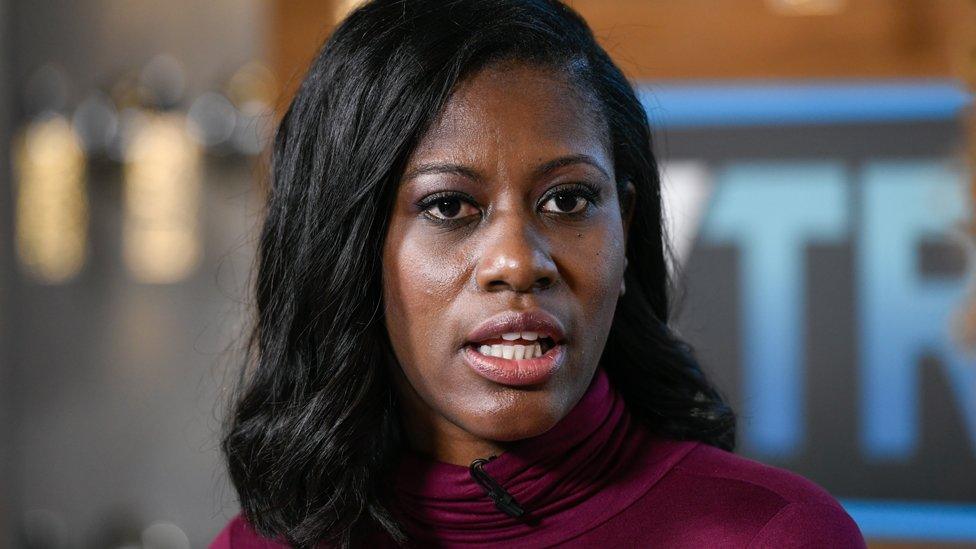
- Published30 May 2019
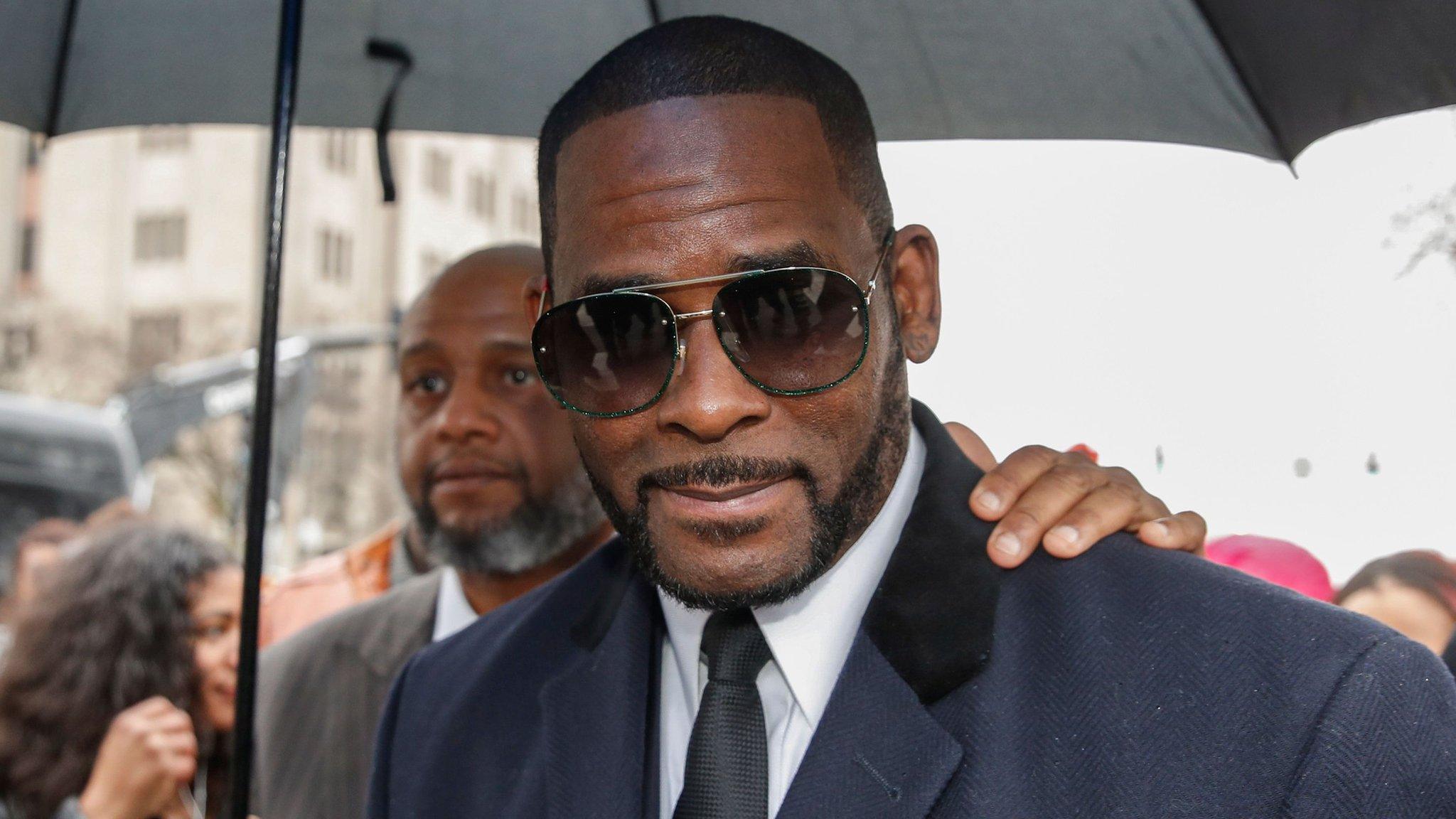
- Published2 May 2019
